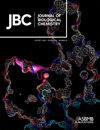CDK-Dependent Phosphorylation Regulates PNKP Function in DNA Replication.
IF 4
2区 生物学
Q2 BIOCHEMISTRY & MOLECULAR BIOLOGY
引用次数: 0
Abstract
Okazaki fragment maturation (OFM) stands as a pivotal DNA metabolic process, crucial for genome integrity and cell viability. Dysregulation of OFM leads to DNA single-strand breaks- accumulation, which is linked to various human diseases such as cancer and neurodegenerative disorders. Recent studies have implicated LIG3-XRCC1 acting in an alternative OFM pathway to the canonical FEN1-LIG1 pathway. Here, we reveal that polynucleotide kinase-phosphatase (PNKP) is another key participant in DNA replication, akin to LIG3-XRCC1. Through functional experiments, we demonstrate PNKP's enrichment at DNA replication forks and its association with PCNA, indicating its involvement in replication processes. Cellular depletion of PNKP mirrors defects observed in OFM-related proteins, highlighting its significance in replication fork dynamics. Additionally, we identify PNKP as a substrate for cyclin-dependent kinase 1/2 (CDK1/2), which phosphorylates PNKP at multiple residues. Mutation analysis of these phosphorylation sites underscores the importance of CDK2-mediated PNKP phosphorylation in DNA replication. Our findings collectively indicate a novel role for PNKP in facilitating Okazaki fragment joining, thus shedding light on its contribution to genome stability maintenance.CDK 依赖性磷酸化调控 PNKP 在 DNA 复制中的功能
冈崎片段成熟(OFM)是一个关键的 DNA 代谢过程,对基因组完整性和细胞活力至关重要。冈崎片段成熟失调会导致 DNA 单链断裂累积,这与癌症和神经退行性疾病等多种人类疾病有关。最近的研究表明,LIG3-XRCC1 是典型的 FEN1-LIG1 通路之外的另一种 OFM 通路。在这里,我们揭示了多核苷酸激酶-磷酸酶(PNKP)是 DNA 复制的另一个关键参与者,与 LIG3-XRCC1 类似。通过功能实验,我们证明了 PNKP 在 DNA 复制叉处的富集及其与 PCNA 的关联,这表明它参与了复制过程。细胞中 PNKP 的耗竭反映了在 OFM 相关蛋白中观察到的缺陷,突出了它在复制叉动力学中的重要性。此外,我们还发现 PNKP 是细胞周期蛋白依赖性激酶 1/2(CDK1/2)的底物,CDK1/2 会使 PNKP 在多个残基上磷酸化。对这些磷酸化位点的突变分析强调了 CDK2 介导的 PNKP 磷酸化在 DNA 复制中的重要性。我们的研究结果共同表明了 PNKP 在促进冈崎片段连接中的新作用,从而揭示了它对维持基因组稳定性的贡献。
本文章由计算机程序翻译,如有差异,请以英文原文为准。
求助全文
约1分钟内获得全文
求助全文
来源期刊

Journal of Biological Chemistry
Biochemistry, Genetics and Molecular Biology-Biochemistry
自引率
4.20%
发文量
1233
期刊介绍:
The Journal of Biological Chemistry welcomes high-quality science that seeks to elucidate the molecular and cellular basis of biological processes. Papers published in JBC can therefore fall under the umbrellas of not only biological chemistry, chemical biology, or biochemistry, but also allied disciplines such as biophysics, systems biology, RNA biology, immunology, microbiology, neurobiology, epigenetics, computational biology, ’omics, and many more. The outcome of our focus on papers that contribute novel and important mechanistic insights, rather than on a particular topic area, is that JBC is truly a melting pot for scientists across disciplines. In addition, JBC welcomes papers that describe methods that will help scientists push their biochemical inquiries forward and resources that will be of use to the research community.
 求助内容:
求助内容: 应助结果提醒方式:
应助结果提醒方式:


